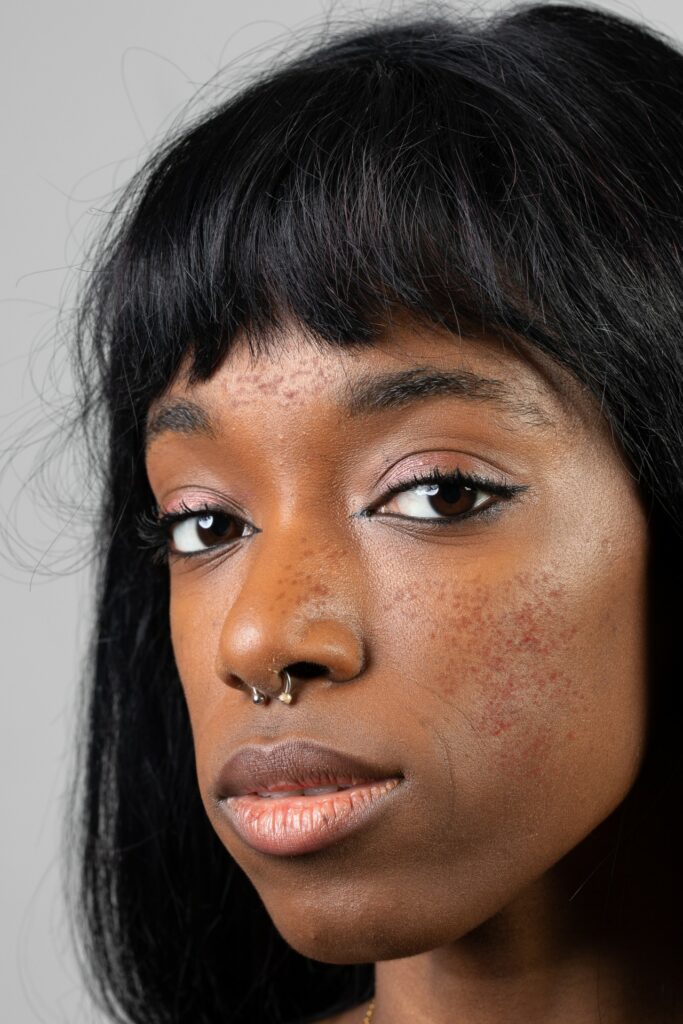Does Rosacea Affect Those with Darker Skin Tones?

On light skin, rosacea is more straightforward to diagnose with visible signs of flushed spots that can be triggered by things like rigorous exercise or an embarrassing moment. On darker skin tones, rosacea is often misdiagnosed. However, men and women of color do experience the uncomfortable symptoms of rosacea. They can be properly diagnosed and treated by a professional dermatologist who is experienced and certified in melanin-rich skin care.
Rosacea flare-ups are inflammations that make individuals uncomfortable and self-conscious. The abundance of misinformation about rosacea, including that it is simply blushing or only occurs on white skin, leads to the dismissal of its existence in those with darker skin tones. There is little information available about rosacea on black and brown skin, which is largely the problem. The skin condition affects 2% of those with darker skin, but if you are in that 2%, you deserve an accurate diagnosis and treatment options.
Flushed Cheeks and Bumpy Skin
There are different types of rosacea, including flushed cheeks, and the version that creates bumps is appropriately called papulopustular rosacea. Although not as noticeable as rosacea on white skin, the symptoms are the same and are caused by inflammation. Rosacea most often shows up on the face and is made up of small broken blood vessels. A person looks flushed and red when the blood vessels widen and become larger. Skin may become sensitive, swell, and possibly change texture.
The symptoms of flushing are disguised more in patients with darker skin tones, which is why it is often less noticeable to others with lighter skin. However, those with black and brown skin who have rosacea see violet, purple, and brown areas on their faces and feel its effects. The rosacea that creates pustules on the face is often misdiagnosed as acne. Another challenge is that many beauty products are designed for lighter skin, and those with darker skin may have stronger reactions to certain ingredients meant to help with acne. The good news is that when working with someone experienced and trained in dermatology for darker skin tones, they have the knowledge and access to the treatments that work.
Skilled Dermatologists Know What to Look For
When visiting a dermatologist, it is crucial to find one who is certified in working with darker skin tones. Skin of Color Society is an organization dedicated to finding excellent skincare for those with darker skin tones. Dermatology for lighter and darker skin is more different than people realize.
Conditions for Accurate Diagnosis
Dermatologists who understand skincare for darker tones know what to look for when diagnosing a client. Examinations are done in the office, and experienced dermatologists will perform the exam in good lighting and ensure that the skin is bare and clean. Professional dermatologists have everything they need to get an accurate diagnosis of rosacea, acne, and other skin concerns.
In some patients, rosacea will work its way up to the eyes and can cause dryness and itching. Asking about eyes being irritated, watery, dry, and itchy is a strong sign of a rosacea diagnosis.
Examinations should be personal, asking about environmental factors, lifestyle habits, and skincare products that may be affecting, triggering, or worsening skin reactions.
Risks of Misdiagnosis or Avoiding Treatment
One of the side effects of either ignoring symptoms of rosacea or being misdiagnosed is an increased chance of complication later. Risks include hyperpigmentation and skin thickening, which can adversely affect a person’s vision in some cases.
Rosacea Treatments for Dark Skin
Treating rosacea on darker skin tones starts with an accurate diagnosis and known treatments. Unfortunately, many medical books and product lines do not cater to women and men of color. This is where someone trained in skin care for darker skin can be a lifesaver. The knowledge and education alone allow specialized dermatologists to focus on the right questions to ask so they can accurately identify patterns and triggers so clients can avoid them when possible.
Dermatologists advise patients to have a regular skincare routine that includes cleansing, moisturizing, and sunscreen. Licensed dermatologists can prescribe anti-inflammatories and perform laser pulses to shrink the blood vessels. Skincare treatment plans should be tailored to match each client’s unique needs and desires for their skin. Melanin-rich skin deserves the same attention, diagnosis, and treatment for rosacea. Find a reputable dermatologist with experience working with darker skin tones who you believe genuinely cares about your skin and never makes you feel rushed or that your questions aren’t good ones!
Contact Buckhead Dermatology today at 404-816-4000 for an appointment with Dr. Sherrie Straughn, who is actively part of the Skin of Color Society.
